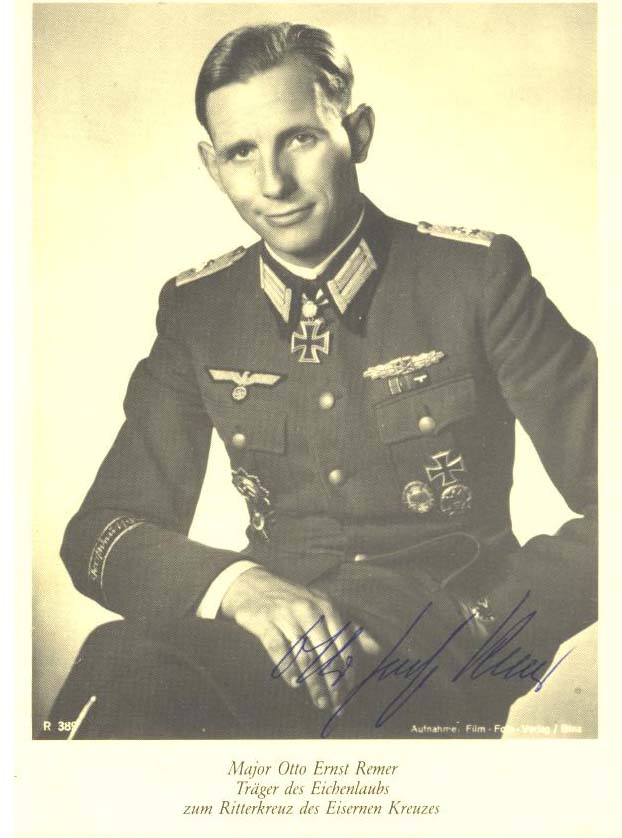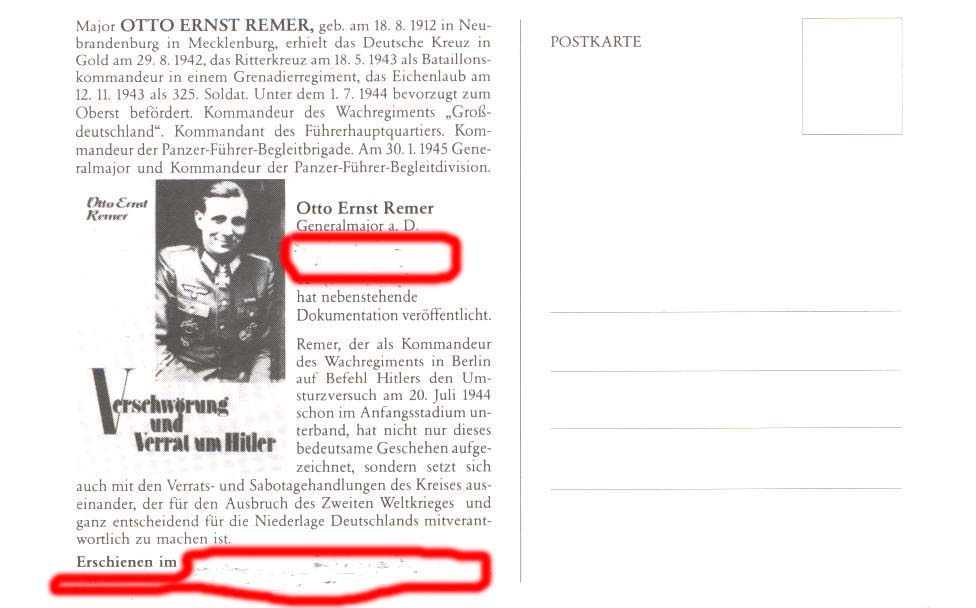

|
~SOLD~REMER Otto-Ernst
Generalmajor
Remer, Otto-Ernst
* 18.08.1912 Neubrandenburg
+ 04.10.1997 bei Malaga / Spanien
Awarded Knights Cross: 18.05.1943
as: Major Kommandeur I./GrenRgt "Großdeutschland"
Awarded Oakleaves: 12.11.1943
as: Major Kommandeur I.(gep.)/GrenRgt (mot.) "Großdeutschland"
Biography
Remer was born in Neubrandenburg on 18 August 1912. He volunteered for military service in 1932 at the age of 20.
War service
By the time of the attack on Poland, in September 1939, he was an oberleutnant in a motorised infantry company, and went on to serve in the Balkans campaign, as well as in Operation Barbarossa, the invasion of the Soviet Union. By April 1942, he was a battalion commander, and he joined the Infantry Regiment Großdeutschland, in order to lead the special-weapons 4th (Heavy) Battalion, which supported the three rifle battalions of the elite regiment. By February 1943, he commanded the 1st (armoured) battalion of Grenadier Regiment Grossdeutschland (GD), after the original Infantry Regiment GD expanded to become a full division. His troops, mounted in halftracks, covered the withdrawal of an entire Waffen SS tank corps during the fighting at Kharkov. He was awarded the Knight's Cross for his service as battalion commander, and in November 1943, he was awarded the Oakleaves to the Knight's Cross for leadership at Krivoi Rog, which was presented by Adolf Hitler personally.
In March 1944, after being wounded, Remer—now a major—was chosen to command the Infantry Regiment Großdeutschland, a unit that performed public and security duties in Berlin. During this time, Remer and his men successfully stopped the July 20 plot to seize control of the German government, following the assassination attempt on Hitler. Upon being ordered by General Paul von Hase to arrest Minister of Propaganda Joseph Goebbels, Remer went to Goebbels office to do so, pistol in hand. Goebbels, however, used his oratory skills to dissuade Remer from arresting him, insisting instead that Hitler was still alive. When Remer asked for proof, Goebbels picked up the phone and asked to be put through to Hitler. Within the minute, Hitler was on the phone, and Goebbels handed the receiver to Remer. The Fuhrer asked Remer whether he recognized his voice, then gave Remer orders to crush the plot with his troops, which he did. That same night Remer was promoted two ranks to oberst (colonel).
Remer discussed this incident in the British TV documentary series The World At War, produced in the early 1970s. He appeared to have no regrets about his role in crushing the plot, nor the war in general.[2] The same was true of his appearance as himself (coaching a young actor who was to portray him) in the German-language documentary drama about the July 20 assassination attempt, filmed by the German historian Joachim Fest.
Remer went on to command an expanded Führer Begleit Brigade (FBB), a field unit formed from a Grossdeutschland cadre, in East Prussia with little success. His men suffered high casualties, reportedly due to his leadership. The brigade then transferred to the west for the Ardennes Offensive, in December 1944, and again suffered high casualties for little gain.
In 1945, when the FBB was expanded to divisional status, he was promoted to generalmajor (major general), and appointed to command it. He was not considered a successful division commander, for when the FBD moved to Silesia in March 1945, Remer was criticized for lack of ability once again. He was eventually captured by US troops, and remained a prisoner of war until 1947.
Political life
Remer's Socialist Reich Party, which he had co-founded in 1950, was banned in 1952, after it had gathered about 360,000 supporters in Lower Saxony, and won 16 seats in the state parliament. The Socialist Reich Party also won eight seats in the Bremen state parliament.
From 1991 to 1994, Remer put out his own publication, the Remer-Depesche. Remer was sentenced to 22 months of imprisonment in October 1992, for writing and publishing a number of articles that were said to incite racial hatred, through their questioning of the Holocaust. He filed numerous appeals, and eventually fled to Spain, prior to his actually being incarcerated.
Exile and death
In February 1994, Remer went into exile in Spain, in a successful effort to avoid imprisonment for his controversial public statements about the Holocaust. Remer was an avid supporter of studies by key individuals in Holocaust denial, such as Fred Leuchter and Germar Rudolf.
The high court of Spain ruled against appeals made by the German government to extradite Remer, claiming that he had not committed any crime. Later living in Egypt and Syria, Remer returned to Spain, and remained a wanted man in Germany until his 1997 death in Marbella at 85.
Legacy
A fellow veteran of the Grossdeutschland Division had the following to say about his former comrade:
We, his former comrades, have deeply regretted that destiny confronted this young officer in July 1944 with a situation with consequences the bearing of which I should assume are beyond the powers of any human being. No judgement will be made here as to whether his decision on July 20 was right or wrong. But the consequences of his decision were so terrible, and have cost so much of the best German blood, that we old soldiers had expected that a man to whom destiny gave such a burden to carry until the end of his life would recognize this, and would thereafter live quietly and in seclusion. We, his former comrades, lack any sympathy for the fact that Herr Remer fails to summon up this attitude of self-effacement.
Information courtesy of Wikipedia.com
Signed postwar 4” x 6” postcard,reverse of which is an advert for his book. On the reverse He has whited out the address’s in two spots, I have circled them in red (the red is not on the card)
Price: $0.00
Please contact us before ordering to confirm availability and shipping costs.
Buy now with your credit card
other ways to buy
|


